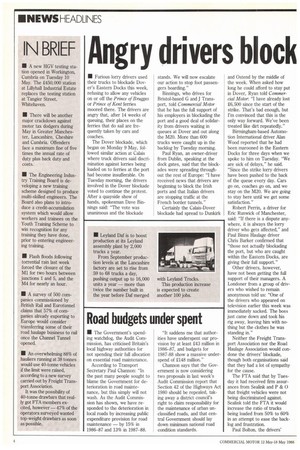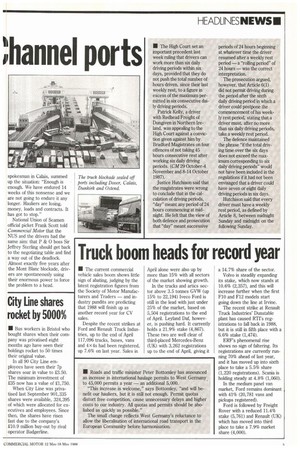Angry drivers block :hannel ports
Page 14

Page 15

If you've noticed an error in this article please click here to report it so we can fix it.
• Furious lorry drivers used their trucks to blockade Dover's Eastern Docks this week, refusing to allow any vehicles on or off the Prince of Brugges or Prince of Kent ferries moored there. The drivers are angry that, after 14 weeks of queuing, their places on the ferries that do sail are frequently taken by cars and coaches.
The Dover blockade, which began on Monday 9 May, followed similar action at Calais where truck drivers said discrimination against lorries being loaded on to ferries at the port had become insufferable. On Tuesday morning, the drivers involved in the Dover blockade voted to continue the protest. After a quayside show of hands, spokesman Dave Binnings said: "The vote was unanimous and the blockade stands. We will now escalate our action to stop foot passengers boarding."
Binnings, who drives for Bristol-based G and J Transport, told Commercial Motor that he has the full support of his employers in blockading the port and a good deal of solidarity from drivers waiting in queues at Dover and out along the M20. More than 600 trucks were caught up in the backlog by Tuesday morning.
Paul Ryan, an owner-driver from Dublin, speaking at the dock gates, said that the blockades were spreading throughout the rest of Europe: "I have received news that drivers are beginning to block the Irish ports and that Italian drivers are stopping traffic at the French border tunnels."
Certainly the Calais-Dover blockade had spread to Dunkirk
and Ostend by the middle of the week. When asked how long he could afford to stay put in Dover, Ryan told Commercial Motor: "I have already lost 26,500 since the start of the strike. That's bad enough, but I'm convinced that this is the only way forward. We've been treated like dirt repeatedly."
Birmingham-based Automotion International driver Alan Wood reported that he had been marooned in the Eastern Docks for three days when we spoke to him on Tuesday. "We are sick of delays," he said. "Since the strike lorry drivers have been pushed to the back of the queue every day. Cars go on, coaches go on, and we stay on the M20. We are going to stay here until we get some satisfaction."
Robert Perrin, a driver for Eric Runwick of Manchester, said: "If there is a dispute anywhere, it is always the lorry driver who gets affected," and Paul Binns Haulage driver Chris Barker confirmed that "those not actually blockading the port, but who are caught within the Eastern Docks, are giving their full support."
Other drivers, however, have not been getting the full support of their managers. A Londoner from a group of drivers who wished to remain anonymous told us: "One of the drivers who appeared on television earlier this week was immediately sacked. The boss just came down and took his rig away, leaving him with nothing but the clothes he was standing in."
Neither the Freight Transport Association nor the Road Haulage Association would condone the drivers' blockade, though both organisations said that they had a lot of sympathy for the cause.
The PTA said that by Tuesday it had received firm assurances from Sealink and P & 0 that freight vehicles were not being discriminated against. Sealink told the FTA it would increase the ratio of trucks being loaded from 50% to 60% in an attempt to ease the backlog and frustration.
Paul Bolton, the drivers' spokesman in Calais, summed up the situation: "Enough is enough. We have endured 14 weeks of this nonsense and we are not going to endure it any longer. Hauliers are losing, money, loads and contracts. It has got to stop."
National Union of Seamen official picket Frank Scott told Commercial Motor that the NUS and the drivers had the same aim: that P & 0 boss Sir Jeffrey Sterling should get back to the negotiating table and find a way out of the deadlock. Almost exactly five years after the Mont Blanc blockade, drivers are spontaneously using their enormous power to force the problem to a head.
















































































































